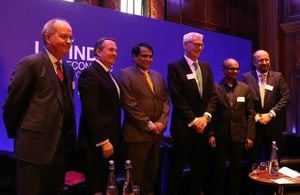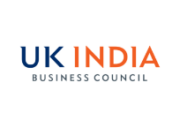So, what does the Indian Commerce Minister’s visit mean for UK business?
Thursday and Friday saw a whirlwind of activity during the visit to London by India's Commerce Minister, Mr Suresh Prabhu. Both days were packed and productive.

Thursday was the 12th UK-India Joint Trade Committee meeting, led by Dr Liam Fox and Mr Prabhu. The day started with a seminar on the smart city opportunities in Pune, and was followed by B2B working groups on smart cities and advanced manufacturing, the Ministerial, the plenary where Dr Fox and Mr Prabhu addressed an audience of 150 UK and Indian businesses, an interaction between Minister Prabhu and UK manufacturing SMEs, and a roundtable and dinner for Mr Prabhu to interact with major UK businesses investing in India.
On Friday, Mr Prabhu addressed the press and gave two speeches: the first on “The Commonwealth as a Trade and Investment Bloc” and the second, at the London School of economics, on the role of trade and investment in driving sustainable development. Then he was guest of honour at a dinner hosted by India’s excellent High Commissioner to the UK, Mr YK Sinha.
All action, no talk?
So, lots of action, but was there any substance?
Well, yes, and I’ll come to that in a moment. But I want to first mention the atmospherics, which were as good as I’ve seen at a JETCO and surprisingly good given that this was the first time the two ministers have met.
In B2B, G2G and B2G meetings there were lots of ideas, creativity, and, dare I say it, buzz. Not just from the businesses, but also the ministers, who used words like “vibrant”, “positive”, and “optimistic”. In the more intimate interactions with UK investors, the Minister was equally upbeat, and was really engaged and open to ideas.
Joint Trade Review
The substance from the G2G dialogue was the emerging outcomes of the Joint Trade Review (JTR), which was established to identify the barriers that can be addressed bilaterally in advance of the UK leaving the EU and without holding FTA discussions.
To start with, the JTR will focus on three broad sectors where there are opportunities and barriers on both sides: food and drink; pharma, life sciences, and healthcare; and IT and ITES. The UK India Business Council will be working with our members and partners across industry and government to take the JTR work forward. We’re keen to get started.
There are also actions coming out of the two working groups that took place on Thursday.
Smart Cities and Infrastructure
The smart cities and infrastructure working groups agreed that there is scope for much stronger collaboration, especially in urban transport, water, and airports.
While 80% of all masala bonds, worth a total of £3.9 billion, have been issued in London and largely used for infrastructure projects in India, the group felt that this is just the tip of the iceberg in terms of attracting finance from the UK into India’s infra development.
There was also an appetite to do more to leverage UK Export Finance.
The working groups agreed to address the barriers stopping UK architects from investing and practising in India, and the Department for International Trade (DIT) announced that a planned delegation of Indian airport developers and operators will be coming to the UK in March.
Advanced Manufacturing and Technology Collaboration
The advanced manufacturing and tech collaboration working group focussed on, well, tech collaboration. Particularly looking at how the UK’s Catapult Centre model can be taken to India, and the development of manufacturing centres of excellence. Innovative ways to develop manufacturing skills was also prominent.
Our CEO Richard Heald build on this theme in his remarks to open the JETCO plenary session by setting out his view that the UK-India partnership will be shaped by our increasingly digital world and that manufacturing and digital technology will be central:
“India is developing a “digital first” economy. The UK and India are natural partners in this area. And the beauty of this partnership is there is much that the UK can learn from India. And much that the UK can contribute. Indeed, the UK and India are already establishing collaborations. A great example is the recent Rolls Royce – TCS collaboration on digital manufacturing. Make in India and Digital India merging.”
The full text of Richard’s remarks is can be read here.
Was the visit overshadowed by visas?
At bilateral occasions over the last year or so, including the November 2016 JETCO meeting, there has been much discussion on work visas. I counted only one reference last week, which was when Dr Fox relayed a compelling fact on Thursday afternoon: more UK work visas go to Indians than to the rest of the world combined.
The Secretary of State also shared the positive message that UK-India trade grew by 15% in the first three quarters of 2017 compared to the same period in 2016. After a few years of flatlining trade, this was good to hear.
Dr Fox’s full speech is here.
The Commonwealth
With the Commonwealth Heads of Government Meeting (CHOGM) happening in London in April, it wasn’t surprising that both ministers talked about the Commonwealth.
It was rightly pointed out that while the economies of the Commonwealth are very diverse, there are linked economic, social and security benefits to significantly improving intra-Commonwealth trade, and the April gathering of leaders provides an ideal opportunity to kick-start this agenda.
My colleague, Tara Panjwani, has written a short piece on intra-Commonwealth trade, drawing on the speech Minister Prabhu made specifically on this topic on Friday.
So, what does all this mean?
In terms of intra-Commonwealth trade, I think an ambitious agenda will emerge from the heads of government meeting in April. And it will be a long-term agenda.
As Dr Fox noted on Thursday, the Commonwealth’s economies are very diverse. And I believe that the blocks that exist in the WTO also exist in the Commonwealth. So, in the near to medium term, a trade deal seems remote. But, incremental steps, over a sustained period – say five to ten years – could see intra-Commonwealth trade grow ahead of trend.
These incremental steps could follow what the UK has done, and India is doing. That is, a focus on improving the ease of doing business.
For example, efforts to, enforce the rule of law, simplify or remove FDI barriers, reduce tax complexity, remove corruption, accelerate bureaucratic processes, and enhance efficiency at ports all make it easier to trade.
The UK’s Prosperity Fund and DfID technical assistance support have a big role to play. India’s successful introduction of e-governance is a model for others. And the UK-India partnership on ease of doing business can be replicated by our Commonwealth partners.
For this incremental ease of doing business-orientated approach, never mind a deeper trade and investment pact, to happen there needs political leadership. India and the UK should be central, but to get buy-in across the board there needs to be broad-based leadership from diverse economies across different geographies. For instance, G20 markets such as Canada, Australia and South Africa, other large economies like Nigeria, and smaller African economies like Rwanda, plus representatives from the Caribbean and the South Pacific.
While the Commonwealth agenda is in its nascent stages, the UK-India relationship is already motoring. The bilateral investment relationship is exceptionally strong. And I think we will see UK-India trade growth accelerate further in 2018.
Not just because our two economies are growing, but because there is a complementarity between the economies (eg, digital and manufacturing), and because both Governments demonstrated last week a commitment to removing the barriers that cause under-performance in bilateral trade.
The Joint Trade Review will, I believe, remove barriers to trade and investment, increase business confidence, and unlock potential in sectors that are important to both countries.
Over the two days of Mr Prabhu’s visit, we saw: fantastic atmospherics; a lot of energy; great B2B, G2G, and B2G discussions; a roadmap, through the JETCO working groups and the Joint Trade Review, to greater bilateral trade and investment; and an ambition to re-boot the Commonwealth as a trading block.
This, now, has to be translated into impactful action. No mean feat. But with the right plan and creative engagement, the visits of Mr Jaitley for the EFD and Mr Modi for CHOGM in April are excellent opportunities to build momentum in removing barriers to trade an investment and to establish a rock-solid foundation for a thriving UK-India partnership.

 By Kevin McCole
By Kevin McCole 


